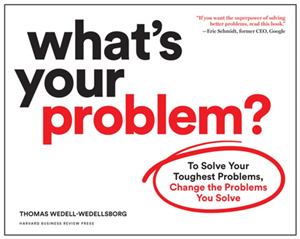BOOK REVIEW
 Book Title: What’s Your Problem?
Book Title: What’s Your Problem?
Author: Thomas Wedell-Wedellsborg
Publisher: Harvard Business Review Press
List Price: $35.00
Publication Date: 2020
Format: Softcover, 213 pages
ISBN: 978-1-63369-722-5
Reviewer: Michael J. Miers, PMP
Review Date: June 2020
Introduction
What’s Your Problem? approaches problem solving in such clear and concise way that you can begin applying concepts right away without the need to finish the book completely. Immediately the reader is challenged to frame and give consideration to ensuring that the right problem is being solved. How the problem is framed not only helps to determine the actions and efforts towards solutions overall, but also keeps one from addressing the wrong problem in the first place. The illustrations used to support the process are deliberate, simple and straight forward. The book is written in a way that the reader can take immediate application of the core concepts.
Following the strategy prescribed in the framework helps one to make better decisions by avoiding false starts, wasted efforts and misuse of resources. The reframing loop is a reflective action that plainly speaks to the question, “What problem is it that we are trying to solve?”. The efforts made by stepping through and reexamining ill-defined problems can result in a more accurate and actionable problem statement. Looking outside the frame is strategy used as well to ensure that the big picture is considered.
Overview of Book’s Structure
What’s Your Problem? is arranged in three parts:. Solve the Right Problem, How to Reframe and Overcome Resistance. The parts are followed by an Appendix: Recommended Reading, a Notes Section an Index, an Acknowledgement Section and finally a section About the Author.
Material is arranged as follows:
Part One – Solve the Right Problem
Introduction – What’s Your Problem?
Chapter 1 – Reframing Explained
Part Two – How to Reframe
Chapter 2 – Getting Ready to Reframe
Chapter 3 – Frame the Problem
Chapter 4 – Look Outside the Frame
Chapter 5 – Rethink the Goal
Chapter 6 – Examine Bright Spots
Chapter 7 – Look in the Mirror
Chapter 8 – Take Their Perspective
Chapter 9 – Move Forward
Part Three – Overcome Resistance
Chapter 10 – Three Tactical Challenges
Chapter 11 – A Word in Parting
Appendix: Recommended Reading
Notes
Acknowledgements
About the Author
Highlights
After the term Reframing is explained in Chapter One, the main concentration of the book was in Part Two where focus was on Reframing the Problem. This Part was complete and comprehensive, taking the reader from Preparing to Reframe, to examination of the problem and then finally an opportunity to reexamine with reflection opportunities.
More…
To read entire Book Review, click here
About the Reviewer

Michael J. Miers, MBA, PMP
Texas, USA
![]()
Michael J. Miers is a Quality Manager with experiences leading Research and Development projects and technical sales support functions. He has a track record for achieving improvements in cost, quality, cycle time and business processes. Additional experience: Project Management, Project Management Professional (PMP) certification. ISO Internal Auditor for ISO 9001 Quality and ISO 14001 Environmental Stds, Six Sigma Green Belt Certified and Black Belt trained, Risk Assessment Moderator, Design for Reliability, Engineering Documentation Control. BS Degree in Industrial Engineering Technology and a Masters of Business Administration.
Associate Faculty teaching courses in: Production and Operations Management, Computer Graphics and Design, Project Procurement Management and Management of Organizations.
Michael can be contacted at MJMiers@hotmail.com or on Linkedin at https://www.linkedin.com/in/mikemiers/
Editor’s note: This book review was the result of a partnership between the PM World Journal and the PMI Dallas Chapter. Authors and publishers provide books to the PM World Journal; books are delivered to the PMI Dallas Chapter, where they are offered free to PMI members to review who agree to provide a review within 45 days; book reviews are published in the PM World Journal and PM World Library.
If you have read a good recently-published book related to managing programs, projects or teams of professionals, consider authoring a book review for publication in the PM World Journal. For our standard format or for more information, contact Editor@pmworldjournal.com or visit https://pmworldlibrary.net/book-review-program/
If you are an author or publisher of a project management-related book, and would like the book reviewed through this program, please contact Editor@pmworldjournal.com.









